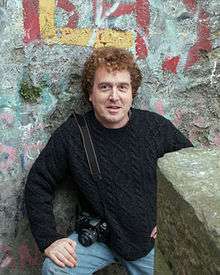David Eppstein
| David Eppstein | |
|---|---|
 In September 2005 at Limerick, Ireland during the 13th International Symposium on Graph Drawing | |
| Born |
David Arthur Eppstein 1963 (age 54–55)[1] England |
| Residence | Irvine, California |
| Citizenship | American |
| Alma mater | |
| Known for | |
| Scientific career | |
| Fields | Computer science |
| Institutions | University of California, Irvine |
| Thesis | Efficient algorithms for sequence analysis with concave and convex gap costs (1989) |
| Doctoral advisor | Zvi Galil |
| Website |
11011110 |
David Arthur Eppstein (born 1963) is an American computer scientist and mathematician. He is a Chancellor's Professor of computer science at the University of California, Irvine.[2] He is known for his work in computational geometry, graph algorithms, and recreational mathematics. In 2011, he was named an ACM Fellow.
Biography
Growing up in Santa Barbara, CA, Eppstein excelled at Mathematics and Latin in school. He received a B.S. in Mathematics from Stanford University in 1984, and later an M.S. (1985) and Ph.D. (1989) in computer science from Columbia University, after which he took a postdoctoral position at Xerox's Palo Alto Research Center. He joined the UC Irvine faculty in 1990, and was co-chair of the Computer Science Department there from 2002 to 2005.[3] In 2014, he was named a Chancellor's Professor.[4] In October 2017, Eppstein was one of 396 members elected as Fellows of the Council of the American Association for the Advancement of Science.[5]
Research interests
In computer science, Eppstein's research is focused mostly in computational geometry: minimum spanning trees, shortest paths, dynamic graph data structures, graph coloring, graph drawing and geometric optimization. He has published also in application areas such as finite element meshing, which is used in engineering design, and in computational statistics, particularly in robust, multivariate, nonparametric statistics.
Eppstein served as the program chair for the theory track of the ACM Symposium on Computational Geometry in 2001, the program chair of the ACM-SIAM Symposium on Discrete Algorithms in 2002, and the co-chair for the International Symposium on Graph Drawing in 2009.[6]
Selected publications
- Eppstein, David (1999). "Finding the k shortest paths". SIAM Journal on Computing. 28 (2): 652–673. CiteSeerX 10.1.1.39.3901. doi:10.1109/SFCS.1994.365697.
- Eppstein, D.; Galil, Z.; Italiano, G. F.; Nissenzweig, A. (1997). "Sparsification—a technique for speeding up dynamic graph algorithms". Journal of the ACM. 44 (5): 669–696. doi:10.1145/265910.265914.
- Amenta, N.; Bern, M.; Eppstein, D. (1998). "The Crust and the β-Skeleton: Combinatorial Curve Reconstruction". Graphical Models and Image Processing. 60 (2): 125–135. doi:10.1006/gmip.1998.0465.
- Bern, Marshall; Eppstein, David (1992). "Mesh generation and optimal triangulation" (PDF). Technical Report CSL-92-1. Xerox PARC. Republished in Du, D.-Z.; Hwang, F. K., eds. (1992). Computing in Euclidean Geometry. World Scientific. pp. 23–90.
Books
- Eppstein, D.; Falmagne, J.-Cl.; Ovchinnikov, S. (2008). Media Theory. Springer-Verlag. ISBN 978-3-642-09083-7.
See also
References
- ↑ Eppstein, David. "11011110 - User Profile". livejournal.com. Archived from the original on June 30, 2012. Retrieved November 1, 2016.
- ↑ "Chancellor's Professors - UCI". Retrieved November 1, 2016.
- ↑ "David Eppstein's Online Curriculum Vitae" (PDF). Retrieved April 9, 2008.
- ↑ "UCI Chancellor's Professors". Archived from the original on November 15, 2002. Retrieved August 18, 2014.
- ↑ American Association for the Advancement of Science (24 November 2017). "2017 AAAS Fellows approved by the AAAS Council". Science. pp. 1011–1014. doi:10.1126/science.358.6366.1011.
- ↑ 17th International Symposium on Graph Drawing
External links
- David Eppstein's profile at the University of California, Irvine
- David Eppstein at DBLP Bibliography Server
- David Eppstein publications indexed by Google Scholar
- David Eppstein's Wikipedia userpage